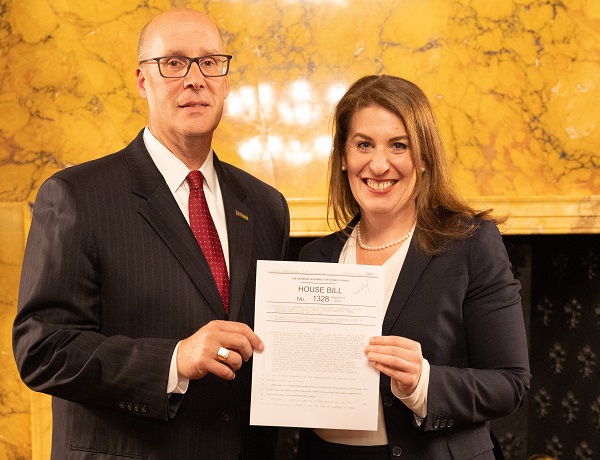Welcome to the PIT
The Professional Issues Tracker keeps you informed of the legislation, testimony, statements, and thought leadership the PICPA is providing on behalf of all Pennsylvania CPAs and the accounting profession.
This is how we build a better profession.

We are currently tracking 15 issues relevant to the accounting profession.

We are spearheading change to ensure a solid future.
Challenges Facing the CPA Profession
Sentence about the pipeline and ong term human capitol strategy.
Charitable Giving Bill
The issue
State Reps. Abigail Salisbury (D-Allegheny) and Keith Greiner, CPA (R-Lancaster), introduced legislation supported by the PICPA that would raise the monetary threshold that subjects charitable organizations to more extensive financial oversight, including mandatory audits. Under House Bill 1824, charitable organizations receiving annual contributions of $1 million or more (currently $750,000) would be required to have an audit. Those receiving contributions of less than $1 million would have different levels of review or compilation required on their financial statements to be performed by an independent CPA.
Our position
The PICPA believes this legislation will benefit many not-for-profit organizations while also relieving human capital pressures in the CPA community.
Status: House Bill 1824 is pending in the House State Government Committee. Memo.
Tax Appeal Reform
The issue
State Sen. Scott Hutchinson (R-Venango) and Rep. Tim Briggs (D-Montgomery) introduced Senate Bill 1051 and House Bill 1994, respectively, legislation backed by the PICPA that would streamline the process of resolving disputes with the Department of Revenue (DOR). The proposed legislation would permit the Board of Finance and Revenue (BF&R), which hears and resolves appeals of final decisions from the DOR that involve most types of tax disputes, to consider late-filed tax appeals from the DOR and create a settlement process for taxpayers as an alternative to the formal and lengthy court appeals process.
Our position
This legislation would empower BF&R to direct and oversee a formal settlement process for any tax appeal that would benefit from this procedure. This taxpayer-friendly solution also benefits Pennsylvania by resolving tax issues sooner, collecting tax liabilities quicker, and directing resources toward more complex cases.
Status: Senate Bill 1051 was approved by the Senate Finance Committee on March 20 and is currently in the Appropriations Committee. Memo.
House Bill 1994 is pending in the House Finance Committee. Memo
Corrective Legislation for Intangible Expense Addback Credit
The issue
Pennsylvania’s corporate net income tax (CNIT) law requires certain intangible expenses or costs to be added back when paid to an affiliate. When the affiliate is also subject to income tax (in Pennsylvania or elsewhere), a credit is currently allowed. This credit is calculated using the taxpayer’s CNIT apportionment and it has the potential to be applied in a manner that results in double taxation. This situation is exacerbated by the establishment of an economic nexus standard and a change to market-based sourcing of intangibles pursuant to Act 53 of 2022. Effective beginning with the 2023 tax year, these changes are expected to significantly increase the number of affiliates subject to CNIT.
Our position
The PICPA will support corrective legislation to replace the current inequitable credit mechanism with a simpler deduction that avoids unnecessary complexity and relieves double taxation. Legislation should be introduced to allow an affiliate that is subject to CNIT a deduction equivalent to the intangible expenses or costs added back under the current law.
Optional Entity-Level SALT Cap Workaround
The issue
The federal Tax Cuts and Jobs Act (TCJA) of 2017 imposes a $10,000 limitation on the deduction individual taxpayers may claim for state and local taxes paid for tax years 2018-2025 (SALT cap). This limitation presents challenges for taxpayers, particularly owners and shareholders of businesses structured as partnerships or S corporations. Income generated from the activities of these pass-through entities is currently taxed at the owner level at Pennsylvania’s 3.07% personal income tax rate.
Our position
The PICPA is urging state lawmakers to adopt legislation that provides a revenue-neutral elective pass-through entity tax (PTET) to allow tax to be paid at the entity level and facilitate the federal deductibility of state income taxes. In doing so, Pennsylvania will better align with those states that have already enacted similar legislation to provide their constituents with a path to an increased federal tax deduction. To date, 36 of the 41 states imposing a personal income tax have passed similar legislation. The PICPA supports Senate Bill 659 (Sen. Aument) and House Bill 1584 (Reps. Pisciottano/Greiner).
Status: Senate Bill 659 was approved by the Senate Finance Committee on March 20 and is currently in the Appropriations Committee. Memo.
House Bill 1584 is pending in the House Finance Committee. Memo.
Resident Partner Credit
The issue
Pennsylvania resident partners who are subject to a PTET in other jurisdictions may incur a double tax based on the denial of a Pennsylvania resident credit, even though the same amount of tax is being paid to the other states through the PTET as was paid directly by Pennsylvania residents. The Pennsylvania DOR has articulated its position that a Pennsylvania resident partner is not entitled to a credit against personal income tax for PTET paid to other states. This contrasts with the DOR’s position that a Pennsylvania resident S corporation shareholder is eligible for a similar personal income tax credit.
Our position
The PICPA supports Senate Bill 660 (Aument) and House Bill 1584 (Pisciottano/Greiner) as legislation that would allow the same credits for resident partners and S corporation shareholders, alleviating this potential for double taxation.
Status: Senate Bill 660 is pending in the Senate Finance Committee. Memo.
House Bill 1584 is pending in the House Finance Committee. Memo.
E-Filing Local Tax Reform
The issue
In the interest of simplifying local taxes from the standpoint of Pennsylvania's taxpayers and tax preparation practitioners, the PICPA is urging the state General Assembly to allow the electronic filing of local earned income tax returns. This will help modernize local tax filing while leveraging existing systems and processes to hold down costs and other impacts. Modernized e-File (MeF) is a federal program run by the IRS that allows taxpayers and professionals to electronically submit a tax return directly to the IRS and state tax authorities. Forms are converted to a digital layout that tax preparation programs transmit to the federal authority, which in turn transmits the state information directly to state tax authorities.
Our position
Currently, taxpayers can file electronically using the MeF system for their federal and state tax returns. The reforms would incorporate this same process for local earned income taxes.
Status: Representatives from the PICPA had a meeting with Rep. Bob Freeman, chairman of the local government committee in the House, on Dec. 20, 2023, followed by a call with members of the local government Commission in Harrisburg to discuss this issue. Our proposal was well received.
A&A
PCAOB Proposed Rule on NOCLAR
The issue
The Public Company Accounting Oversight Board's (PCAOB) noncompliance with laws and regulations (NOCLAR) proposal would fundamentally change the nature and scope of the audit by proposing to change the auditor’s responsibility for identifying noncompliance with laws and regulations. These responsibilities would be greatly expanded to include those agencies having an indirect impact on the financial statements or operational compliance such as EPA, OSHA, FDIC, FDA, FCPA, AML on privacy laws, tax laws, and consumer protection laws.
Our position
The PICPA is vigorously advocating against the untenable expansion of the scope of the audit proposed by the PCAOB.
Legislative outreach efforts are in progress. PICPA members are strongly encouraged to reach out to their state congressional representatives — U.S. Reps. Mike Kelley, Matt Cartwright, Brian Fitzpatrick, and U.S. Sen. John Fetterman — to make them aware of this significant issue.
Status: The PCAOB issued additional questions in connection with Roundtable Discussions and additional comments were due March 18, 2024, with PCAOB review subsequent to the close of the comment period.
Read our full response (PDF)
Audit Quality and Standards
The issue
The AICPA Code of Professional Conduct requires practitioners to maintain a high level of practice excellence. This is an ongoing challenge.
Our position
We support high and consistent audit quality and rigorous standards that support high audit quality. To raise awareness of the need to maintain high audit quality, the PICPA has hosted a town hall on the AICPA’s Quality Management Standards and the results of the DOL Audit Quality study, and are working on additional education highlighting performance challenges. We are also monitoring the AICPA projects on standards revisions related to fraud that are intended to improve audit quality.
Status: Open for comment - comments are due June 5, 2024. The PICPA is currently evaluating our response.
Ethics
Tax Planning and Related Services
The issue
The International Ethics Standards Board for Accountants (IESBA) proposed revisions to the Code of Professional Conduct (the Code) are intended to develop a principles-based framework, leveraging the fundamental principles and the conceptual framework of the Code to guide practitioners when providing tax planning and related services to clients or performing tax planning activities for employing organizations.
Our position
The PICPA has significant concerns regarding this far-reaching proposal that would potentially conflict with authoritative tax regulations, expose tax practitioners to additional legal liability, and require accountants to factor stakeholder perceptions into their proposed tax planning services. The adoption of these aggressive tax standards could jeopardize the use of the CPA credential for tax planning services.
Status: IESBA deliberations are in progress.
Read our full response (PDF)
Using the Work of an External Expert
The issue
The Exposure Draft on Using the Work of an External Expert proposes an ethical framework to guide professional accountants or sustainability assurance practitioners, as applicable, in evaluating whether an external expert has the necessary competence, capabilities and objectivity in order to use that expert’s work for the intended purposes. The proposals also include provisions to aid in applying the Code of Professional Conduct’s conceptual framework when using the work of an external expert.
Our position
A proposal has been issued and the PICPA is currently evaluating our response.
Status: Open for comment - comments due April 30, 2024
IESBA - Ethics Standards for Sustainability Assurance
The issue
The International Ethics Standards Board for Accountants (IESBA) approved the proposed new International Ethics Standards for Sustainability Assurance (including International Independence Standards) (IESSA) and proposed Revisions to the International Code of Ethics for Professional Accountants (the Code) on Sustainability Reporting. The Exposure Draft contains proposed independence standards for use by all sustainability assurance practitioners regardless of whether they are professional accountants, and specific ethics provisions relevant to sustainability reporting and assurance.
Our position
A proposal has been issued and the PICPA is currently evaluating our response .
Status: Open for comment - comments due May 10, 2024
CPA Exam Window Extension
The issue
To increase the accounting pipeline capacity and remove further barriers to entry within the industry, it's important to rethink the 18-month window to pass all parts of the CPA Exam.
Our position
The PICPA supports extending the exam window from 18 to 30 months. In addition to our support of reinstating credits for exams lost during the pandemic, the PICPA has encouraged the State Board to adopt the new suggested window of time for future candidates to complete their exam.
Status: Approved
A Win for the Profession: The Importance of NASBA's CPA Exam Window Extension
by PICPA CEO Jennifer Cryder, CPA, MBA
NASBA approves one-year extension to CPA Exam window
Journal of Accountancy
Work and Learn
The issue
According to research conducted by the Center for Audit Quality (CAQ) and PICPA, the significant time and cost associated with the pursuit of 150 credit hours of education in order to get the CPA license is a barrier for those considering a career in accounting. The additional 30 credits beyond a bachelor’s degree is leading many candidates to reconsider their choice of career or delay pursuing licensure.
Our position
Providing Work and Learn programs and opportunities offers a practical, feasible solution to help grow the accounting profession. The PICPA is helping to facilitate these programs and encouraging higher education institutions and firm leaders to adopt these programs.
Work-and-Learn Models for CPA Candidates: Taking Action to Eliminate Barriers
by PICPA CEO Jennifer Cryder, CPA, MBA
Pennsylvania CPAs try out work-and-learn model
Accounting Today
The CPA Pipeline Crisis
The issue
The pipeline challenges the profession are facing are reflective of the fact that relevance of CPAs are in question. Firms must lean on business model transformation to fix the relevance problem and thus pipeline. Firms are struggling to attract new talent, keep their Gen 2 or Gen 3 around, and grow their practice.
Our position
The PICPA believes it is critical that business owners and executives in the accounting profession look inward and plan for significant adjustments to address our current pipeline and quality challenges. Firms must look at how their current model is set up and determine if it's time to change. The next generation of CPAs must be provided with more to unlock their potential and keep them interested. Firms can do this by building more distinct career paths, adding new revenue opportunities or client services and automating or digitizing their business. This will give employees a greater sense of purpose while increasing revenue channels. Clients have come to value CPAs as business advisors and not just bookkeepers. By expanding client services to encompass consulting, mergers and acquisitions, and more, accounting firms can better support their CPAs, fostering professional growth and development. Such a diversified service portfolio allows these firms to cross-sell to clients, strengthening client relationships and ensuring long-term business sustainability. The tech-savvy generations coming into the profession are increasingly drawn to career paths that promise innovation and technological advancement, and presenting accounting in this light will be a significant draw. CPA firms must also rethink their equity and compensation strategy. Rethinking an entire business model and implementing meaningful changes won't happen overnight, but the conversation needs to be had before it is too late.
Why the CPA Profession Needs to Overcome its Challenges Quickly and Collaboratively
by PICPA CEO Jennifer Cryder, CPA, MBA
The Evolving Role of State Societies
The Unique CPA Podcast
Why the CPA qualification’s 150-hour college credit rule is outdated–and inequitable
Fortune
Dual Enrollment
The issue
Early exposure to accounting is proven to be influential to students choosing majors and future career plans. There is also significant cost associated with obtaining a college degree and, specifically, the additional credits needed for a CPA license. Offering high school students the chance to enroll in a college accounting course not only introduces them to exciting curriculum, but also offers an affordable way to begin obtaining college credits.
Our position
The PICPA has partnered with Outlier to offer a 3 credit, completely virtual asynchronous Intro to Accounting Course through the University of Pittsburgh, paid for by the PICPA. Students participating in the program have a support person at their school who can provide direction through proctoring exam and adhering with course timeline.
Why the CPA Profession Needs to Overcome its Challenges Quickly and Collaboratively
by PICPA CEO Jennifer Cryder, CPA, MBA
PICPA and Outlier Bring College Accounting to High Schools
by Matt Greene and Kristen Wilbert • CPA Now Blog


